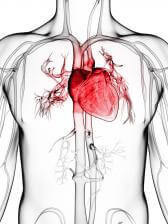Mystery Diagnosis: Chest Pain
Calvin is a 48-year-old CEO of a water filtering company who has been experiencing chest pain for 2 weeks. Find out what the most common causes of chest pain are and how his doctor determined the root of his scary symptoms. House Call Doctor is on the case!

So I thought it would be a good idea to instead learn more about chest pain and what really goes through a doctor’s mind when patients first present with this potentially alarming symptom. Let’s learn about chest pain via another mystery diagnosis case.
Sponsor: Netflix Instant Streaming. Watch thousands of TV episodes and movies on your PC, Mac, iPad, iPhone or Touch. Or on your TV through your XBox, PS3 or Wii. All streamed instantly by Netflix, saving you time, money and hassle. For a free 30-day trial, including the new Netflix Original Series House of Cards, go to Netflix qdt.
The Chief Complaint
Calvin is a 48-year-old man who came to see me in the clinic with a “chief complaint” of chest pain (“chief complaint” is a medical term used to describe the “main symptom”). I had seen Calvin several times in my clinic before for his high blood pressure. He’s an interesting guy – very humorous and loves to talk to me about his 3 rambunctious children (whom I also take care of) and his job as the CEO of his father’s water filtering company. When the economy took a dive, Calvin started to feel the pressure at work. He’s been putting in long hours. And when he goes to bed, his mind really starts to wander and that’s when he feels the stress and subsequent chest pain.
The History
Chest pain has a seemingly endless list of possibilities as a cause, so doctors really need to get more details from the patient – this is referred to as the “history of present illness.”
Calvin reveals that he has been experiencing this chest pain for the last 2 weeks, only at nights when trying to go to sleep. The pain feels like an “ache” right in the middle of his chest, and typically lasts 30 minutes or so. It is moderate in severity, and does not radiate to anywhere else in his body. He humorously adds that his pain seems to magically resolve after taking a few sips of his company’s filtered water – Calvin is a great salesman.
The Past Medical History
Calvin is overweight, as he doesn’t make much time for exercise and tends to eat on the go. As a result, he was diagnosed with high blood pressure several years ago, but has been able to control it with a medication that he takes once a day. Other than that, he’s a pretty healthy guy. However, heart disease seems to run in his family and his own father died from a heart attack 10 years ago, leaving him the responsibilities of the business.
Differential Diagnosis
For each “chief complaint,” doctors start to immediately compile a mental list of possible causes. For chest pain, this list is long – much longer than I can possibly cover in an episode. But we can break down some of the more common causes to a few main organs as possible culprits:

When considering this as a possibility for Calvin, I ran a mental checklist of risk factors for heart disease when speaking to him. These include:
· High blood pressure
· Diabetes
· Smoking
· Family history of heart attack or stroke
· High cholesterol
· Obesity
Calvin does suffer from high blood pressure, although it is well-controlled with medication at the moment. And he is overweight and rather sedentary. His father also suffered from a heart attack at an early age. So heart disease does run through my mind as a possible cause for his chest pain. But he does not have diabetes, his cholesterol is normal, and he doesn’t smoke.
As a note, heart attack in a young patient (less than age 40) is not common – unless there is cocaine or methamphetamine use involved.
Also, other anatomical changes can cause chest pain as well – such as structural heart valve abnormalities and problems with the aorta (the big blood vessel attached to the heart). So can inflammation or infection of the heart (called myocarditis) or the inflammation of the lining of the heart (called pericarditis). But these causes of chest pain are not as common.
2. Lung: The lungs are very close in proximity to the heart, and therefore symptoms can overlap or mimic each other. Thankfully, Calvin has never been a smoker and he also is not experiencing any problems with his breathing – no shortness of breath or coughing, which would make me think of possible lung causes. Here are a few lung problems that can also cause chest pain:
· Pulmonary Emboli: This is a clot in the lung that typically travels from the leg. It occurs in those with a personal or family history of clotting disorders, or in patients with recent history of inactivity (like right after hip or leg surgery, or recent travel on an airplane). This typically causes a sudden onset of symptoms, often includes shortness of breath, and usually symptoms don’t just come and go. Some patients also report a swelling in one leg, along with possible pain. This doesn’t sound like Calvin’s situation at all.
· Pneumothorax: This is a hole in the lung that is often caused by trauma (but can also be spontaneous). Again, this is also typically sudden in onset and doesn’t just come and go. It tends to be more severe, and also associated with shortness of breath. This also doesn’t sound like Calvin.
· Pneumonia: Patients with pneumonia can have chest pain, but they often also report fevers, chills, cough, and overall malaise. Calvin’s chest pain doesn’t seem infectious.

4. Musculoskeletal: The rib cage, muscles, and nerves all encase the heart and lungs. And when doing heavy lifting or strenuous movement with our upper bodies, we can also strain these areas. Patients will often report chest pain, and the pain is said to be “reproducible” (meaning we can trigger it) by touching it or with certain movements. Some patients will say that it hurts more when they take a deep breath as well. Calvin’s pain is not reproducible by the touch or triggered with deep breaths, and he hasn’t been doing anything strenuous.
5. Anxiety: Anxiety and stress can certainly cause chest pain in some patients. Patients who experience panic attacks, attacks of severe anxiety, often include chest pain as a symptom, along with shortness of breath, sweating, heart racing, and an feeling of intense “impending doom” where they feel like they’re going to die in that moment. This is particularly a concern in young people with chest pain, because panic attacks often begin when young. Although symptoms can really mimic heart etiologies of chest pain, and therefore these patients should be evaluated promptly.
Diagnosis
Deciding what tests to run on a patient who presents with chest pain depends on many factors – their age, their personal medical history, their history of present illness, their family history, their vital signs in clinic (blood pressure, pulse, weight, oxygenation level, etc.), and the results of the physical exam. So you can see that it takes a good deal of information gathering, before deciding on what tests to run. Depending on the information available, doctors may run an EKG, a blood test, a stress test, a chest x-ray, an ultrasound of the heart, or possibility nothing at all.
Mystery Diagnosis Revealed
Because Calvin had several risk factors for heart disease, I sent him for a stress test – this is a special test in which we “stress” the heart to see if it is the cause of his pain. His test was thankfully normal.
He has been experiencing a good deal of stress, but he has never experienced panic attacks in the past and he’s 48 years old (a little older than the typical onset of panic disorder, although possible). Before I blame anxiety (which he is obviously experiencing) I decide to dig a little deeper. Upon further questioning, he admitted that he’s been drinking 4-6 cups of coffee a day while putting in long hours at work, and eating spicy foods every day at a new local Mexican restaurant by his job and has been experiencing some heartburn after his meals.
He didn’t think anything of it since he didn’t sense acid reflux, but he did admit that his chest pain occurs when he’s lying down and improves upon sitting up at night. Not all patients actually “sense” the acidic contents of the stomach refluxing up into the mouth. He also lives a rather sedentary lifestyle, is overweight, and consumes a good amount of foods that trigger acid reflux. After changing his diet significantly, having him sleep more upright at nights, and temporarily prescribing a medication that decreases the acidity of the stomach, his night time chest discomfort disappeared.
To learn more about acid reflux make sure to listen to my previous podcast on this topic.
Although the possibilities of chest pain are long, it’s very important that you don’t ignore chest pain. Chest pain is one of those symptoms that doctors take very seriously, and is rather challenging to dissect – therefore, it’s vital that you seek your doctor right away for a thorough history, exam, and possible tests.
Share your ideas and learn more quick and dirty tips with us on the House Call Doctor’s Facebook and Twitter pages!
Please note that all content here is strictly for informational purposes only. This content does not substitute any medical advice, and does not replace any medical judgment or reasoning by your own personal health provider. Please always seek a licensed physician in your area regarding all health related questions and issues.






